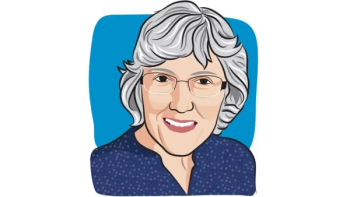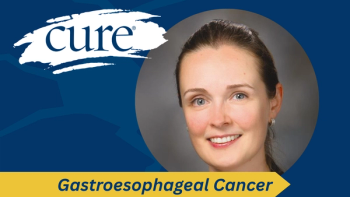
Newly Diagnosed With Ovarian Cancer? Take a Breath, Then Follow These Steps
The first thing a woman should do after receiving a diagnosis of ovarian cancer, according to Teresa P. Díaz-Montes, M.D., M.P.H., is nothing. At least not right away.
The first thing a woman should do after receiving a diagnosis of ovarian cancer, according to Teresa P. Díaz-Montes, M.D., M.P.H., is nothing. At least not right away.
"You feel lost and confused, and everybody is going to give you advice, and everybody is an expert. And you just want somebody to tell you where you have to go," she said. "I usually tell patients, ‘You have to keep calm and breathe, and you will get an answer at some point.’ I would not recommend taking months to figure this out, but you have a window of time. You don't have to rush things."
Díaz-Montes, associate director of the Lya Segall Ovarian Cancer Institute at Mercy Medical Center in Baltimore, delivered her presentation for women with newly diagnosed disease July 14 at the 2018 Ovarian Cancer National Conference in Washington, D.C. The time after a diagnosis is confusing and scary, but there's no reason to panic, she told her audience at the event, sponsored by the Ovarian Cancer Research Fund Alliance.
She recommended finding a partner, such as a close friend or a family member, who can act as a sounding board for serious issues. Then, she said, get organized and informed. A patient will have a lot of information that she needs to keep track of and a lot to learn about this serious but treatable disease. The doctor recommended getting a second opinion before making any decisions, and then trying to get back to normal.
"You should keep your life as normal as possible," she said. "Try not to isolate yourself. If you’re doing that, your mind is going to go crazy and you're not going to be able to focus on the important things."
Staying positive can be a challenge, she said, but it's necessary for mental health, and also because studies have shown that a person's emotional state can affect his or her immune system. She warned that staying positive doesn’t mean that a newly diagnosed woman should ignore negative emotions like anger, sadness or fear. A mental health professional can help patients understand and manage the complex mix of emotions they’re likely to be feeling.
"This is a stressful period. It doesn't mean that you're depressed,” she said. “We go through all these emotions and sometimes we have to talk about it. Sometimes we need somebody else to give us some light or give us some tool to channel us and help us decide, 'OK, this is the way I want to go.'"
Díaz-Montes said that cancer treatment is a group activity. Care teams can improve efficiency, effectiveness and coordination of care, resulting in a better experience for both the patient and the caregiver. But there is no formula for choosing the providers. She recommended that patients find health care practitioners — such as an oncologist, primary care physician, social worker, physical therapist and/or palliative care expert — with whom they feel comfortable.
"Life is a journey,” she said. “You can choose to take a bumpy road or a very dark road. The most important thing is that you have the capacity to decide. You just have to take time to think what you want to accomplish.”
Being A Self-Advocate
Below is a brief sample of questions from Teresa P. Díaz-Montes, M.D., M.P.H., associate director of the Lya Segall Ovarian Cancer Institute at Mercy Medical Center in Baltimore, that patients can ask as active participants in their own care.
- General What lifestyle changes do you recommend so that I can stay as healthy as possible before, during and after treatment? Where can I find more information about my cancer?
- Staging What is the stage and location of my cancer? What is my prognosis?
- Treatment What are my treatment options? What treatment, or combination of treatments, do you recommend? What are the potential short- and long-term side effects?
- Clinical trials What are clinical trials? How do trials help people with cancer? Am I a candidate for a trial?
- Support What kinds of support services are available to me? Where can I find information about managing the cost of treatment? Who handles health insurance questions in your office?
- Follow-up care What follow-up tests do I need and how often will I need them? Is there anything else I need to know?



